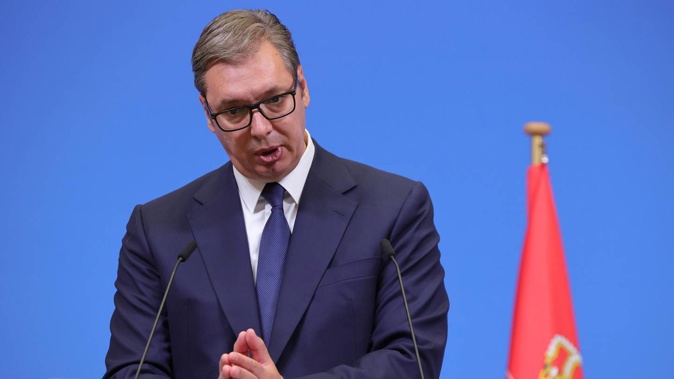
Thousands of troops have descended on a tiny European nation as alarming new tensions threaten to destabilise the fraught region.
Late last month, a fresh – and seemingly bizarre – dispute between the Balkan States of Serbia and Kosovo emerged over changes to licence plate rules.
Under the new plan, residents in majority ethnic Serb areas of Kosovo would be required to replace their Serbian-issued plates with ones issued by Kosovo.
It was enough to trigger widespread unrest, with ethnic Serbs barricading roads and protesting with weapons, sparking fears it would lead to an even more serious clash between the two nations.
The situation deteriorated enough to postpone the rollout of the change by a month following meetings with EU and US representatives, and Nato also stepped in to remove the roadblocks.
The rival nations are set to hold crisis talks on Thursday in a bid to de-escalate tensions in the Balkans.
The rare face-to-face meeting between Serbian President Aleksandar Vucic and Kosovo Prime Minister Albin Kurti will take place in Brussels.
Nato now has a "significant" military presence of almost 4000 troops in Kosovo, according to Secretary-General Jens Stoltenberg, who this week vowed to beef up that number if the conflict were to escalate.
"If needed, we will move forces, deploy them where needed and increase our presence. We have already increased the presence in the north. We are ready to do more," he warned.
And sadly, it seems increasingly likely that could happen.
Nations' troubled history
The bad blood between the two states stretches back decades.
In 2008 – nine years after the Kosovo war, which saw Nato bomb Serbia in response to the killing of Kosovan Albanians – Kosovo broke away from Serbia and declared independence.
But Serbia – a key Russian ally – has never recognised it as a sovereign state, and neither have eight G20 nations, including Argentina, Brazil, China, India, Indonesia, Mexico, Russia and South Africa.
Further complicating matters is the fact the population of Kosovo itself remains divided, with 90 per cent of Kosovo's 1.8 million inhabitants considering themselves to be ethnic Albanian, and 5 per cent ethnic Serbs.
For years, Serbia also blocked Kosovo's membership of international organisations, including the UN, and relations between the two have been even more strained since March this year, when Kosovo's parliament passed a resolution requesting the government "take all necessary steps to join Nato, European Union, Council of Europe and other international organisations".
'Destructive'
While hostilities cooled in light of the licence plate rule change postponement, Kosovo's Prime Minister Albin Kurti hinted the peace might not last during a press conference on Wednesday, a day before an EU-facilitated meeting between Serbia and Kosovo was due to take place.
He included a chilling warning of a possible threat from the neighbouring nation.
"The threats, risks and challenges that Nato faces in the current security environment are felt by our country as well," Mr Kurti said.
"Kosovo's institutions and citizens in the current situation have reason to be vigilant about [the] destructive approach of our northern neighbour towards Kosovo and the region in general under Russia's detrimental agenda for Europe and the Balkans."
Meanwhile, his Serbian counterpart, President Aleksandar Vucic, accused his rival of "lying" about Serbia's alleged plans to attack Kosovo.
"We are going to have difficult discussions [on Thursday]. We do not agree almost on anything," Vucic said, describing Kurti's allegations as "political narrative, a political rhetoric".
"For 180 days we have been listening … and it didn't happen," Vucic said.
"Which means they were lying about it. And there was no rebuking of this narrative from anywhere in the world."
He also warned Kosovo and the wider world not to "blackmail Serbia, or order Serbia how to act. It doesn't work like that".
"When you have been put in the corner and have no room to manoeuvre please do not expect Serbs to say they are enjoying it and having a nice time."
Take your Radio, Podcasts and Music with you









